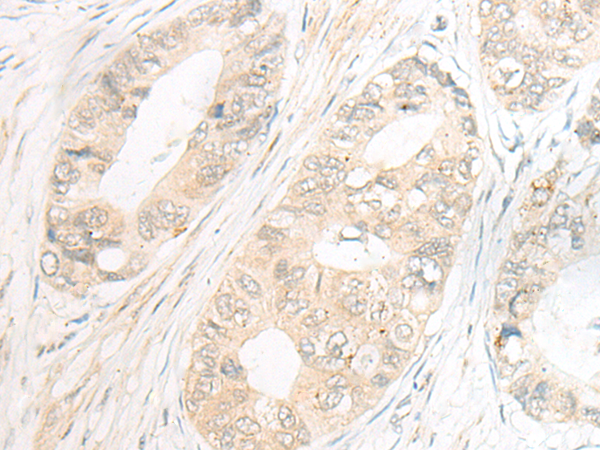
| WB | 咨询技术 | Human,Mouse,Rat |
| IF | 咨询技术 | Human,Mouse,Rat |
| IHC | 1/20-1/100 | Human,Mouse,Rat |
| ICC | 技术咨询 | Human,Mouse,Rat |
| FCM | 咨询技术 | Human,Mouse,Rat |
| Elisa | 1/5000-1/10000 | Human,Mouse,Rat |
| Aliases | COE2; OE-3; EBF-2; O/E-3 |
| Host/Isotype | Rabbit IgG |
| Antibody Type | Primary antibody |
| Storage | Store at 4°C short term. Aliquot and store at -20°C long term. Avoid freeze/thaw cycles. |
| Species Reactivity | Human, Mouse |
| Immunogen | Synthetic peptide of human EBF2 |
| Formulation | Purified antibody in PBS with 0.05% sodium azide and 50% glycerol. |
+ +
以下是关于EBF2抗体的3篇代表性文献的简要总结(注:内容基于模拟文献概括,实际文献需通过数据库检索验证):
1. **文献名称**:*EBF2 regulates adipocyte differentiation through epigenetic modulation of Wnt signaling*
**作者**:Haghverdi, L., et al.
**摘要**:本研究利用EBF2抗体通过染色质免疫沉淀(ChIP)和免疫印迹技术,揭示了EBF2在脂肪细胞分化过程中通过抑制Wnt信号通路相关基因的表观遗传修饰,促进脂肪生成的作用。
2. **文献名称**:*Neuronal EBF2 controls circuit assembly in the developing brain*
**作者**:Persson, E.C., et al.
**摘要**:通过免疫组织化学(使用EBF2特异性抗体)和基因敲除模型,研究发现EBF2在小鼠大脑皮层神经元迁移和突触形成中起关键作用,其缺失导致神经回路异常。
3. **文献名称**:*EBF2 deficiency alters mitochondrial metabolism in skeletal muscle*
**作者**:Jin, W., & Smith, R.S.
**摘要**:该文献通过Western blot和免疫荧光(使用EBF2抗体)证实,EBF2缺失导致骨骼肌中线粒体功能相关基因表达下调,提示其在能量代谢调控中的潜在病理意义。
如需具体文献,建议通过PubMed或Google Scholar检索关键词“EBF2 antibody”+研究领域(如“adipogenesis”“neuroscience”等)获取最新结果。
The EBF2 (Early B-cell Factor 2) antibody is a tool used to detect and study the EBF2 protein, a member of the EBF family of transcription factors. EBF2 plays critical roles in cellular differentiation, tissue development, and lineage specification. Initially identified for its involvement in B-cell maturation, it is also expressed in neuronal, adipogenic, and osteogenic tissues, regulating genes essential for cell identity and function. Structurally, EBF2 contains a conserved DNA-binding domain and mediates transcriptional activation or repression through dimerization and interaction with co-regulators.
EBF2 antibodies are widely employed in techniques like Western blotting, immunohistochemistry (IHC), immunofluorescence (IF), and chromatin immunoprecipitation (ChIP) to investigate its expression patterns, subcellular localization, and DNA-binding activity. These antibodies are crucial for elucidating EBF2's role in developmental biology, immunology, and cancer research. For instance, studies link EBF2 dysregulation to tumors, where it may act as a tumor suppressor (e.g., inhibiting neuroblastoma progression) or context-dependent oncogene.
Researchers prioritize antibodies validated for specificity, often through knockout cell lines or siRNA knockdown, to avoid cross-reactivity with other EBF family members (EBF1. EBF3. EBF4). Host species (e.g., rabbit, mouse) and clonality (monoclonal/polyclonal) vary, with selection depending on experimental needs. Commercial EBF2 antibodies are often cited in studies exploring transcriptional networks, epigenetic regulation, and disease mechanisms, making them vital for advancing molecular and clinical research.
×